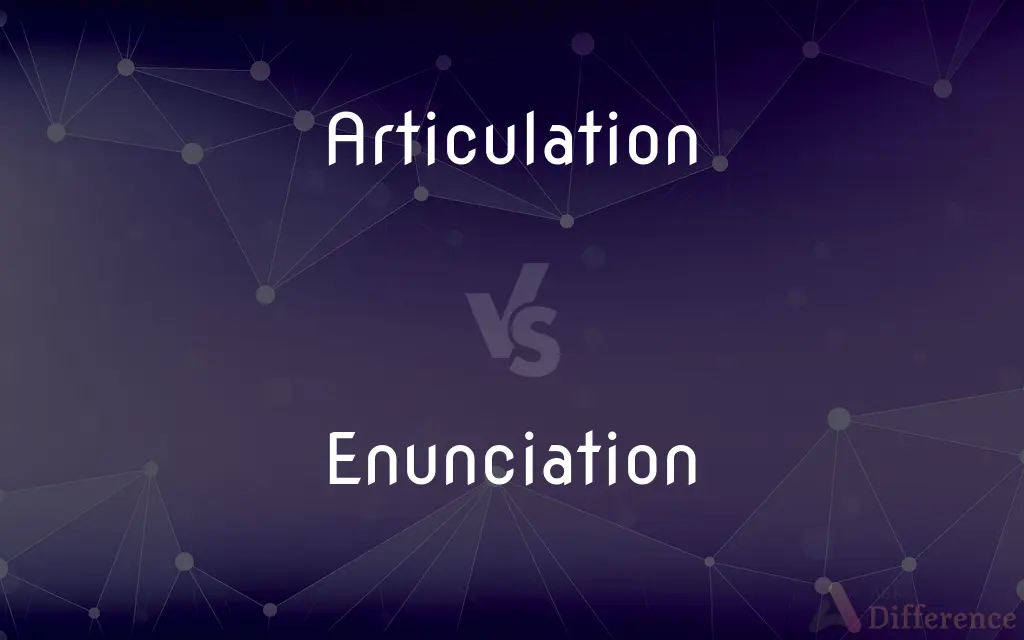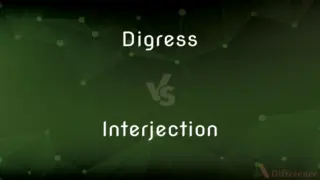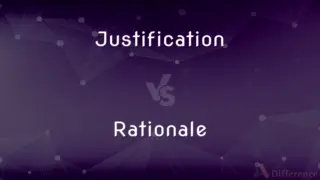Articulation vs. Enunciation — What's the Difference?
By Maham Liaqat & Urooj Arif — Updated on April 16, 2024
"Articulation" refers to the clarity and distinctness in the way words are formed and connected, focusing on the precision of speech, while "enunciation" specifically involves the clear pronunciation of syllables and sounds.

Difference Between Articulation and Enunciation
Table of Contents
ADVERTISEMENT
Key Differences
"Articulation" is about how effectively someone connects and shapes words within their speech, aiming for clarity and fluidity in expressing ideas. On the other hand, "enunciation" focuses on the precise and clear pronunciation of individual sounds and syllables, essential for being understood.
Good articulation enhances the overall comprehensibility of spoken language, making it easier to follow complex ideas or arguments. Whereas, good enunciation ensures that each word's sounds are distinctly heard, preventing misunderstandings due to mumbled or slurred syllables.
Articulation involves the physical aspects of speech production, such as the movement of the jaw, lips, and tongue, which help in forming coherent phrases. In contrast, enunciation is more narrowly focused on vocalizing each sound correctly to avoid blending sounds together.
In contexts such as public speaking or acting, excellent articulation is crucial for delivering persuasive and engaging speeches that flow smoothly. On the other hand, precise enunciation is vital in environments like broadcasting or teaching, where clarity of each word impacts the listener's understanding.
While articulation affects the overall effectiveness and elegance of spoken communication, enunciation deals primarily with the accuracy of sound production, which is foundational to being clearly understood in any spoken interaction.
ADVERTISEMENT
Comparison Chart
Focus
Connection and clarity of words in sentences
Clarity of individual sounds and syllables
Importance
Enhances comprehensibility and fluidity
Essential for clear communication
Physical Aspects
Involves jaw, lips, tongue movements
Focuses on precise vocalization
Key Contexts
Public speaking, acting
Broadcasting, teaching
Outcome
Effective and engaging communication
Avoidance of sound misinterpretation
Compare with Definitions
Articulation
The formation of clear and distinct sounds in speech.
His excellent articulation made even the complex topics easy to understand.
Enunciation
The clarity of speech on a phonetic level.
Voice coaches stress the importance of enunciation.
Articulation
The aspect of speech concerned with linking phonetic sounds smoothly.
Articulation therapy helped her improve her speech fluidity.
Enunciation
The distinct pronunciation of syllables.
Good enunciation is critical when speaking a foreign language.
Articulation
The clarity in the flow of speech.
A public speaker’s articulation can captivate or lose the audience.
Enunciation
The act of pronouncing words clearly.
Her enunciation was so clear that everyone in the room could understand her despite the noise.
Articulation
The act of expressing an idea clearly and effectively in words.
The professor’s articulation of the theory was impeccable.
Enunciation
The articulation of sounds for clear communication.
He practiced his enunciation carefully before his speech.
Articulation
The physical process of producing words and phrases.
Good articulation requires control over one's mouth and respiratory system.
Enunciation
The precision in making speech sounds.
Actors often work on enunciation to ensure every word is heard clearly.
Articulation
The act of vocal expression; utterance or enunciation
An articulation of the group's sentiments.
Enunciation
To pronounce; articulate.
Articulation
The act or manner of producing a speech sound.
Enunciation
To state or set forth precisely or systematically
Enunciate a doctrine.
Articulation
A speech sound, especially a consonant.
Enunciation
To announce; proclaim.
Articulation
A jointing together or being jointed together.
Enunciation
To pronounce words; speak aloud.
Articulation
The method or manner of jointing.
Enunciation
The act of enunciating, announcing, proclaiming, or making known; open attestation; declaration.
It was time for the enunciation of an important truth.
Articulation
A fixed or movable joint between bones.
Enunciation
Mode of utterance or pronunciation, especially as regards fullness and distinctness or articulation.
She speaks with an impressively clear enunciation.
Articulation
A movable joint between inflexible parts of the body of an animal, as the divisions of an appendage in arthropods.
Enunciation
That which is enunciated or announced; words in which a proposition is expressed; formal declaration
Articulation
A joint between two separable parts, as a leaf and a stem.
Enunciation
The act of enunciating, announcing, proclaiming, or making known; open attestation; declaration; as, the enunciation of an important truth.
By way of interpretation and enunciation.
Articulation
A node or a space on a stem between two nodes.
Enunciation
Mode of utterance or pronunciation, especially as regards fullness and distinctness or articulation; as, to speak with a clear or impressive enunciation.
Articulation
The conversion of a student's credits at one school to credits at another school by comparing the curricula.
Enunciation
That which is enunciated or announced; words in which a proposition is expressed; an announcement; a formal declaration; a statement.
Every intelligible enunciation must be either true or false.
Articulation
A joint or the collection of joints at which something is articulated, or hinged, for bending.
The articulation allowed the robot to move around corners.
Enunciation
The articulation of speech regarded from the point of view of its intelligibility to the audience
Articulation
(countable) A manner or method by which elements of a system are connected.
Articulation
(uncountable) The quality, clarity or sharpness of speech.
His volume is reasonable, but his articulation could use work.
Articulation
(linguistics) The manner in which a phoneme is pronounced.
Articulation
The manner in which something is articulated (tongued, slurred or bowed).
The articulation in this piece is tricky because it alternates between legato and staccato.
Articulation
(accounting) The interrelation and congruence of the flow of data between financial statements of an entity, especially between the income statement and balance sheet.
Articulation
(education) The induction of a pupil into a new school or college.
Articulation
A joint or juncture between bones in the skeleton.
Articulation
The connection of the parts of a plant by joints, as in pods.
Articulation
The act of putting together with a joint or joints; any meeting of parts in a joint.
Articulation
The state of being jointed; connection of parts.
That definiteness and articulation of imagery.
Articulation
The utterance of the elementary sounds of a language by the appropriate movements of the organs, as in pronunciation; as, a distinct articulation.
Articulation
A sound made by the vocal organs; an articulate utterance or an elementary sound, esp. a consonant.
Articulation
The aspect of pronunciation that involves bringing articulatory organs together so as to shape the sounds of speech
Articulation
The shape or manner in which things come together and a connection is made
Articulation
Expressing in coherent verbal form;
The articulation of my feelings
I gave voice to my feelings
Articulation
(anatomy) the point of connection between two bones or elements of a skeleton (especially if the articulation allows motion)
Articulation
The act of joining things in such a way that motion is possible
Common Curiosities
What role does enunciation play in teaching?
Clear enunciation helps ensure that information is conveyed accurately and understood by students.
Why is articulation important in public speaking?
Articulation improves the flow and clarity of speaking, which is essential for engaging and persuading an audience.
How does enunciation differ from articulation?
Enunciation focuses on the clear pronunciation of each sound, while articulation concerns the overall clarity and connection of speech.
Are there tools to help with articulation problems?
Yes, speech therapists use various techniques and tools to help improve articulation.
Is enunciation just about speaking loudly?
No, enunciation is about clarity and precision in sound production, not volume.
Can poor articulation affect communication?
Yes, poor articulation can make speech difficult to understand, impacting effective communication.
Can enunciation be improved at any age?
Yes, with practice and possibly professional guidance, enunciation can be improved at any age.
Does articulation involve body language?
While primarily about speech, good articulation can be enhanced by effective body language.
What exercises improve enunciation?
Tongue twisters and vocal exercises can improve the precision of enunciation.
What's the difference between articulation and accent?
Articulation is about clarity in forming words, while accent pertains to how vowels and consonants are pronounced differently depending on one's regional or cultural background.
Does articulation affect perception in professional settings?
Clear articulation can influence the perception of professionalism and competence.
What does articulation mean in speech?
In speech, articulation refers to the clear and precise formation of connected sounds and words.
Are articulation and diction the same?
They are related, but diction more specifically refers to word choice whereas articulation is about clarity of speech.
How does one distinguish between articulation and enunciation problems?
Articulation problems involve issues with the flow of speech, whereas enunciation problems are specific to producing clear individual sounds.
How does one practice good articulation?
Practice involves focusing on the smooth connection of phrases and clarity in expressing ideas.
Share Your Discovery

Previous Comparison
Digress vs. Interjection
Next Comparison
Justification vs. RationaleAuthor Spotlight
Written by
Maham LiaqatCo-written by
Urooj ArifUrooj is a skilled content writer at Ask Difference, known for her exceptional ability to simplify complex topics into engaging and informative content. With a passion for research and a flair for clear, concise writing, she consistently delivers articles that resonate with our diverse audience.















































